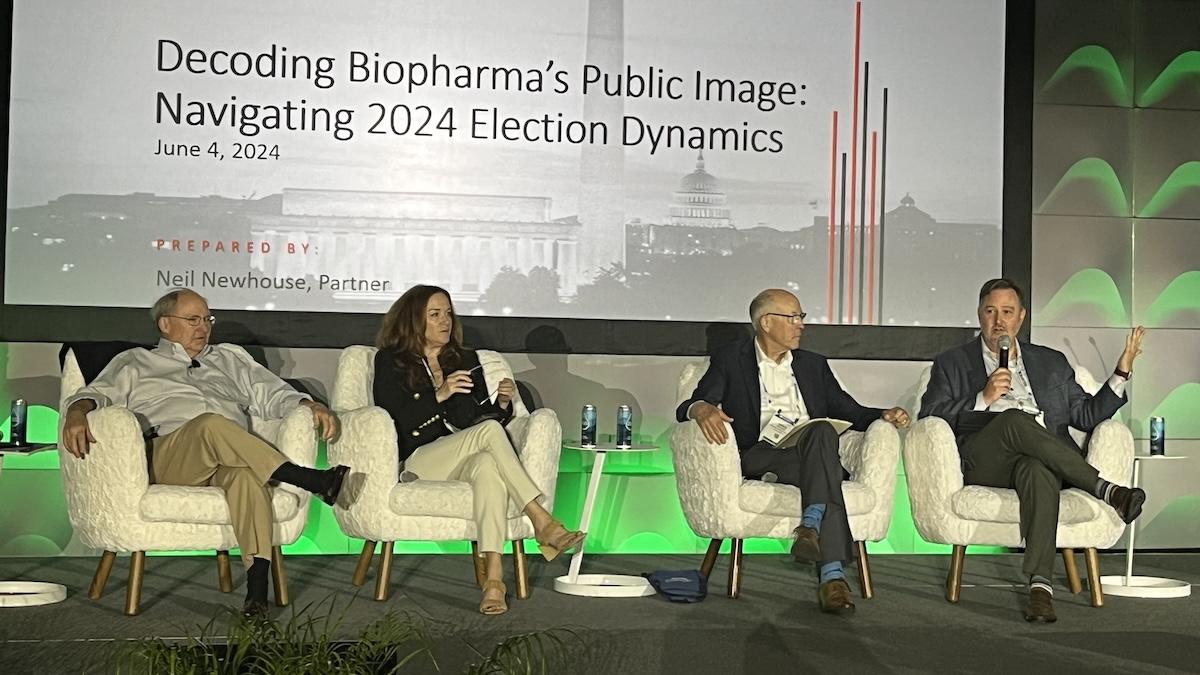At BIO 2024, an industry vows to reclaim its narrative

(L to R) Neil Newhouse of Public Opinion Strategies, former Congresswoman Kathy Rice, former Congressman Greg Walden, and Genentech's Fritz Bittenbender on stage at BIO 2024 in San Francisco.
It’s hard to imagine a better spokesperson for BIO 2024’s message than its architect, BIO CEO and President John Crowley. An impassioned speaker, deft interviewer, and Naval Reserve veteran, Crowley’s claim to fame was his dramatic entry into biotech, leaving a position at Bristol Myers Squibb in 1998 to found Novazyme Pharmaceuticals in a bid to find a cure for his young children’s Pompe disease, then considered incureable.
Those children are now thriving young adults in their late 20s, and Crowley’s remarkable story was chronicled in a book by Pulitzer-winning journalist Geeta Anand, which then inspired a movie starring Harrison Ford and Brendan Fraser (Fraser played the character based on Crowley).
So, when Crowley talks about BIO as a mission-driven organisation in pursuit of cures and treatments to save and improve lives, he’s speaking from a very personal, very authentic, nigh-unimpeachable place.
Why does all this matter? Because when the average person – and, in particular, the average American – thinks about the pharma industry, they’re not thinking of that father on a desperate quest to save his children.
Instead, Americans increasingly think of pharma as a greedy, money-grubbing industry that charges exorbitant prices for life-saving and life-sustaining medications.
A nadir for public perceptions of pharma
At a memorable session at the BIO convention in San Diego this week, pollster Neil Newhouse, co-founder of Public Opinion Strategies, shared sobering data about American public opinions about the pharma industry, which has fallen to rock bottom in Americans' estimations. Only 18% say they approve of the pharmaceutical industry, and 83% of believe the number one factor contributing to high drug prices is the profits made by pharmaceutical companies.
And these are the numbers, by the way, a mere four years after this same industry dramatically developed and distributed a vaccine for the worst global pandemic in a century.
Pharma has always struggled with public perception, but something has changed, Newhouse shared. The industry used to enjoy broad support from Republicans; now, its unpopularity is bipartisan. And that public sentiment filters up to Congress and the White House, especially in an election year.
That’s how the Inflation Reduction Act’s drug pricing negotiation provisions were able to catch pharma so off-guard. And though the IRA is the poster child for what the industry sees as detrimental government intervention in the market, it’s just one symptom. They’re also dealing with major potential impacts from the BIOSECURE Act, an aggressive Federal Trade Commission scrutinising their mergers, and ceaseless Congressional hearings aimed at furthering the narrative that pharma is the arch-villain of out-of-control healthcare pricing.
So, what’s the antidote that Crowley, and by extension BIO, is proposing? Something as simple, and as complicated, as storytelling.
Sharing the facts
The IRA was a wake-up call that it isn’t enough for pharma and biotech to create innovative cures and treatments for disease, nor is it enough to commit to sustainability and patient centricity. Pharma needs to seriously step up its PR if it wants to get the American people, and their government, back in its corner.
At the panel where Newhouse presented his data, he was joined by former Congressional representatives Kathleen Rice, a democrat, and Greg Walden, a republican. Walden pointed out that pharma spends the second most of any American industry on advertising, second only to retail.
“If I were you, I would tell your companies, slice off 10% of your ad budget and tell your story," he said. "You’ve got to get out there and you've got to fight back. Other industries are pushing down on you, and you're taking it."
So, what’s the story that pharma should be out there telling?
For one thing, it’s a bare fact that prescription medications are not the main cost drivers in the healthcare system. They account for 14% of spending, as Amgen CEO Robert Bradway pointed out at the show, compared to 18% for billing and administration, for instance.
And a lot of the sticker price of drugs doesn’t even go to pharma, it gets eaten up by middlemen, like pharmacy benefit managers.
Newhouse went as far as to advocate that pharma “go negative” and really go after health insurers – the only player in healthcare Americans like less than pharma, according to his data.
So, drug prices aren’t the main driver of healthcare costs and they don’t solely enrich pharma. Furthermore, the money that does go to pharma is necessary to support ongoing innovation, pharma insiders argue. There’s a lack of public understanding about the reality that profits from successful drugs have to subsidise drugs that fail their trials and never make it to market, or about the fact that, when a company has a successful drug, it has a relatively short window of exclusivity and it has to price the drugs so as to get the bulk of its ROI in that window (something else Bradway pointed out in his talk).
That information has to find its way not only to the public, but directly to legislatures – Rice, Walden, and Bradway all emphasised the importance of finding real champions in Washington.
"It wasn't so long ago that Ted Kennedy and Orrin Hatch were working together and reaching across the aisle to pass legislation like the Biosimilars Act," Bradway said. “We don’t enjoy that kind of bipartisan support anymore.”
Real storytelling to change hearts and minds
But, as important as it is to communicate all of that, it’s more messaging than it is storytelling. And it’s storytelling that has the real power to change hearts and minds.
Stories like Crowley’s, which was good enough to be made into a Hollywood movie. Or stories like John Lazar’s, a Broadway, TV, and film actor who received a standing ovation when he spoke at BIO about his battle with ALS.
BIO proved this week that its very good at finding and highlighting inspiring patient stories that frame pharma and biotech as sources of hope for the hopeless. But those presentations, affecting as they were, were preaching to the choir.
All the inspiring stories in the world won't make Americans who are struggling to pay for their drugs any happier about that reality. So, all this messaging and storytelling has to come with a plan of pharma's own to keep those prices down - perhaps by campaigning to reduce the share of the sticker price that ends up with the middlemen of the system, or by championing Part 340B reform, as PhRMA did at a recent press panel at ASCO. And it needs to invest in and promote its direct patient assistance programmes.
But the main takeaway is this: if the industry wants to rehabilitate its public image, it needs a plan to take that kind of dynamic, affective patient storytelling to the streets and to remind Americans that the business they’re in is a business of healing and hope.
For more detailed reports on the sessions mentioned in this column, check out our two-part BIO Liveblog.












